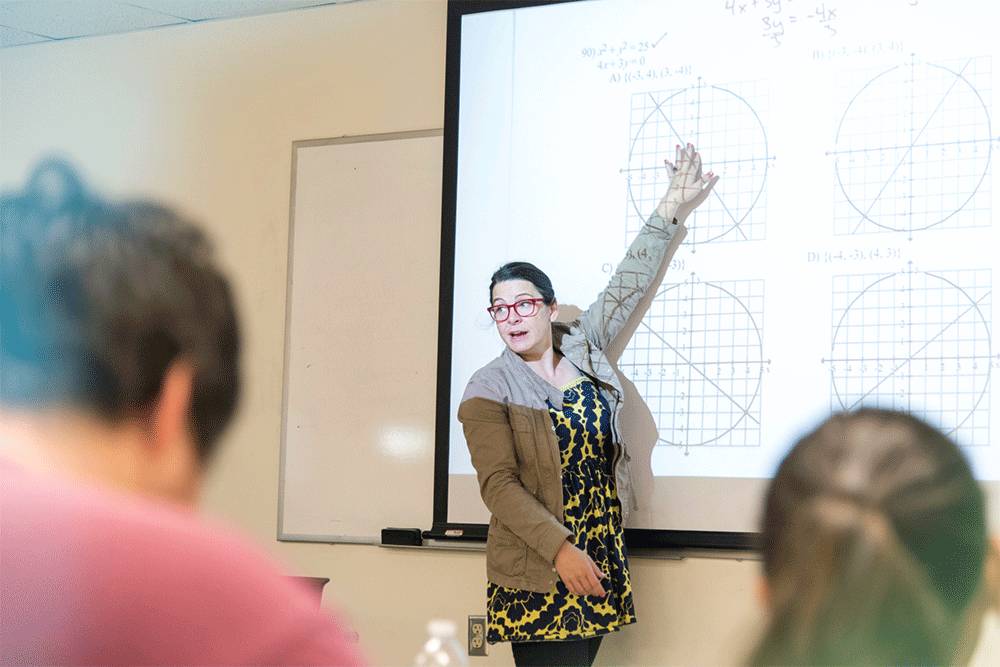Innovative program designed to help individuals and organizations meet the increasing demand for college transitional programs in high schools.
Secondary Education (Teaching Advanced Academics)

Program Overview
Many school districts offer advanced academic programs that allow students to receive college credit while still in high school (e.g., Advanced Placement, International Baccalaureate, Early College High School models). This concentration is designed for certified teachers who want the credential to teach and lead in these programs. Graduate students in this program complete curricular coursework in advanced academics and in a specific content area.
Course Work
Graduate students in this program complete 18 hours of coursework in advanced academics and 18 hours in a specific content area. Advanced academics courses address:
- Preparing educators to teach college courses to high school students who are developmentally in a different place than college students by:
- Comparing characteristics of postsecondary learners with those of secondary learners
- Exploring how postsecondary institutions actively teach learning strategies and develop critical thinking skills
- Identifying teaching practices that can effectively develop postsecondary critical thinking skills in a high school setting
- Knowledge and skills for teaching excellence in dual credit/early college high school teaching and learning by:
- Supporting high school experiences that accurately reflect instructors’ abilities to deliver college-level content and skills
- Systems, organizational, and advisory expertise of how dual credit teaching fits into the P-16 ecosystem by:
- Understanding the role and influence of P-12 and postsecondary relationships
- Analyzing policies and best practices that inform the way students are advised through dual credit programs
- Developing leadership skills essential for successful dual credit programs at the campus and district levels
The remaining 18 hours of coursework are dedicated to a specific content area (e.g., Math, Political Science, History, or English). These courses are content-based rather than curriculum-based, satisfying the current accreditation requirements for post-secondary instructors.
| Degree | Hours | Location |
|---|---|---|
Degree M.Ed. | Hours 36 hours | Location Online |
For more information on online programs, certifications, and international restrictions, visit our Application Policy Information page.
Program Details
The degree programs do not require teacher licensure or prior courses in specific areas for admission.
Program Mission
The mission of the graduate secondary education program is to prepare culturally responsive educators at an advanced level to meet the challenges of the 21st century by:
- enhancing instructional, leadership, inquiry and collaborative expertise
- expanding knowledge, understanding and application of current research
- using technology to make advancements in the teaching-learning process
Career Options
Graduates are well-positioned for teaching college courses at both the high school and postsecondary level. While the focus of the program is to prepare teachers to become dual credit/dual enrollment instructors, graduates will also be positioned to fill adjunct or per course faculty positions at community colleges and undergraduate programs at four-year universities. Graduates will be credentialed to teach postsecondary courses in the content area they choose (e.g., Math, History, etc.) as well as education courses. This program also prepares graduates to succeed in campus and district administrative positions related to dual credit/enrollment or advanced academics.
Program Faculty
Graduate secondary education faculty are nationally recognized leaders and scholars in education. Through their peer-reviewed publications and presentations at national and international conferences, grant writing and awards, and service as officers and board members of professional associations, they bring a wealth of academic and professional experience to the program. They engage in advanced academics research on teacher identity, liminal pedagogies, and student supports in the secondary classroom.
Contact us for general questions about your application, funding opportunities, and more. If you have specific questions after reviewing the program details, contact the program's graduate advisor.

Already know that Texas State is right for you?
Application Deadlines
-
For Entry Prior to Summer 2026
DEADLINES U.S. CITIZEN INTERNATIONAL Fall - Priority February 1 February 1 Fall - Standard June 15 (*Flexible) June 1 Spring October 15 (*Flexible) October 1 Summer I April 15 (*Flexible) March 15 Summer II June 1 (*Flexible) No Admission *This program’s deadline is flexible for those not requiring an F/J visa. A flexible deadline means applications received after the standard deadline may be reviewed on a first-come, first-served basis with no guarantees for admission consideration.
-
Effective for Summer 2026 Entry and Beyond
DEADLINES U.S. CITIZEN INTERNATIONAL Fall - Priority February 1 February 1 Fall - Standard August 1 June 1 Spring - Priority September 1 September 1 Spring - Standard November 1 October 1 Summer I - Priority January 1 January 1 Summer I - Standard May 1 March 15 Summer II - Priority January 1 No Admission Summer II - Standard June 1 No Admission
For important information regarding deadlines and decision timelines, review the Application Policy Information page.
Admission Requirements
The items required for admission consideration are listed below. Additional information for applicants with international credentials can be found on our international webpages.
-
Application
- completed online application
Review important information about the online application.
-
Application Fee
- $55 nonrefundable application fee, OR
- $90 nonrefundable application fee for applications with international credentials
Review important information about application fees.
-
Transcripts & GPA
Transcripts & GPA
- Baccalaureate degree from a regionally accredited university. (Non-U.S. degrees must be equivalent to a four-year U.S. Bachelor’s degree. In most cases, three-year degrees are not considered. Visit our International FAQs for more information.)
- A copy of an official transcript from each institution where course credit was granted.
- A 2.75 overall GPA or a 2.75 GPA in your last 60 hours of undergraduate course work, plus any completed graduate courses.
Review important information about transcripts. Official transcripts, sent directly from your institution, will be required if admission is granted.
-
Test Scores
GRE
- GRE not required
Approved English Proficiency Exam Scores
Applicants are required to submit an approved English proficiency exam score that meets the minimum program requirements below unless they have earned a bachelor’s degree or higher from a regionally accredited U.S. institution or the equivalent from a country on our exempt countries list.
- official TOEFL iBT scores required with a 78 overall
- official PTE scores required with a 52 overall
- official IELTS (academic) scores required with a 6.5 overall and minimum individual module scores of 6.0
- official Duolingo Scores required with a 110 overall
- official TOEFL Essentials scores required with an 8.5 overall
This program does not offer admission if the scores above are not met.
Review important information about official test scores.
-
Documents
- Statement of purpose (one page) that answers the question:
- What has motivated you to enter the teacher profession, become a dual-credit teacher, and/or want to earn your M.Ed.?
Review important information about documents.
- Statement of purpose (one page) that answers the question: